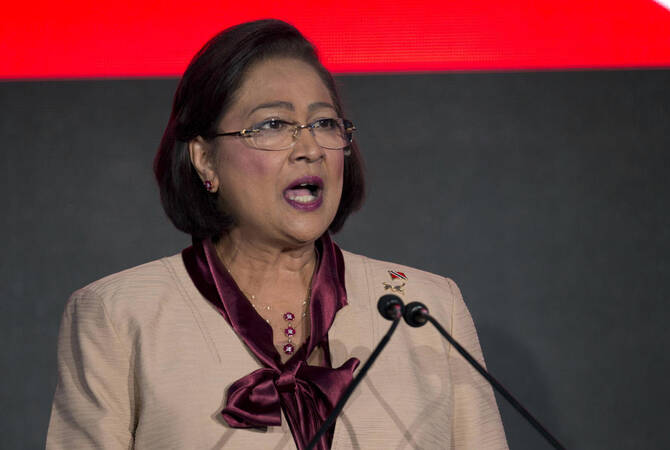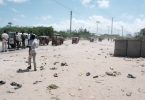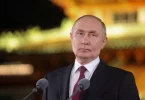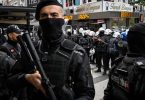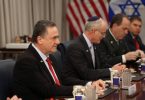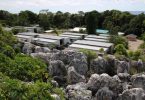PORT-OF-SPAIN, Trinidad (AP): Trinidad and Tobago’s Prime Minister Kamla Persad-Bissessar praised a US strike on a boat suspected of carrying drugs in the southern Caribbean and said that all traffickers should be killed “violently.”
US President Donald Trump said Tuesday that 11 people were killed aboard the boat that had departed Venezuela, which is located near Trinidad and Tobago.
“I, along with most of the country, am happy that the US naval deployment is having success in their mission,” Persad-Bissessar said in a statement late Tuesday. “The pain and suffering the cartels have inflicted on our nation is immense. I have no sympathy for traffickers; the US military should kill them all violently.”
US Secretary of State Marco Rubio has said that the drugs aboard the vessel were likely headed to Trinidad or elsewhere in the Caribbean.
Persad-Bissessar said that restricting illegal guns, drugs and human trafficking would decrease violence in the Caribbean region and the twin-island nation of Trinidad and Tobago, which has imposed two state of emergencies in recent months.
“Our country has been ravaged by bloody violence and addiction because of the greed of the cartels,” Persad-Bissessar said. “The slaughter of our people is fueled by evil cartel traffickers.”
US action under scrutiny
Other Caribbean leaders were more reserved in their remarks.
Barbadian Foreign Minister Kerrie Symmonds told The Associated Press on Wednesday that members of Caricom, a regional trade bloc, sent a letter to US Secretary of State Marco Rubio asking for an open line of communication on developments, saying they want to avoid being surprised by any US moves against Venezuela.
“What we want really…is a structure where we would be able to have shared information affecting US assets in the region, establishing channels of communication and, importantly where possible, some consultation to maintain practical cooperation for continued mutual confidence and avoidance of misunderstandings,” he said.
Symmonds also said that depending on Rubio’s response, both sides could arrange a face-to-face meeting to discuss fears that the region’s long-desired designation as a zone of peace is maintained.
“What effectively we are trying to do is to work through the diplomatic channels of making sure that there are no surprises,” Symmonds said.
Meanwhile, Colombian President Gustavo Petro on Wednesday questioned the US operation, saying that it’s possible to conduct maritime interdiction of drug shipments without attacking a vessel’s occupants. He said that Colombia typically captures them, since those transporting the drugs “are not the big drug traffickers,” but rather, “very poor young people” from the region.
“Bombing the boat violates the universal principle of proportionality of force and results in murder,” the leftist president wrote on X.
Juanita Goebertus, Americas director at Human Rights Watch, said that while organized crime groups are a “huge threat” to human rights in Latin America, regional governments need to strengthen their judicial capacity to dismantle them.
“If the circumstances around this strike are exactly as the administration describes them, it would amount to an extrajudicial execution, prohibited under international law,” she said.
Tren de Aragua tentacles in Trinidad
Trump has said that the vessel targeted in the strike in international waters was operated by the Venezuelan gang Tren de Aragua. The White House didn’t immediately explain how the military determined that those aboard the vessel were Tren de Aragua members.
In July, the government of Trinidad and Tobago designated Tren de Aragua as a terrorist organization, meaning that authorities can freeze any property, funds or assets owned or controlled by the gang.
Authorities have confirmed that the gang is active in the Caribbean nation, with its presence mainly in central and east Trinidad.
A high-ranking police official with deep knowledge of gang operations told the AP that Tren de Aragua’s operations are on a small scale in Trinidad. He said the group still has to contend with bigger local gangs and don’t stay in certain areas when they go to Trinidad to collect money or talk business.
The official, who spoke on condition of anonymity because he feared repercussions, said authorities don’t have an estimate of how many Tren de Aragua gang members operate in the twin-island nation given their constant illegal entry and departure. He said they deal mostly in drug, weapons and human trafficking.
The strike came after the US announced last month that it planned to boost its maritime force in waters off Venezuela to fight threats from Latin American drug cartels.

